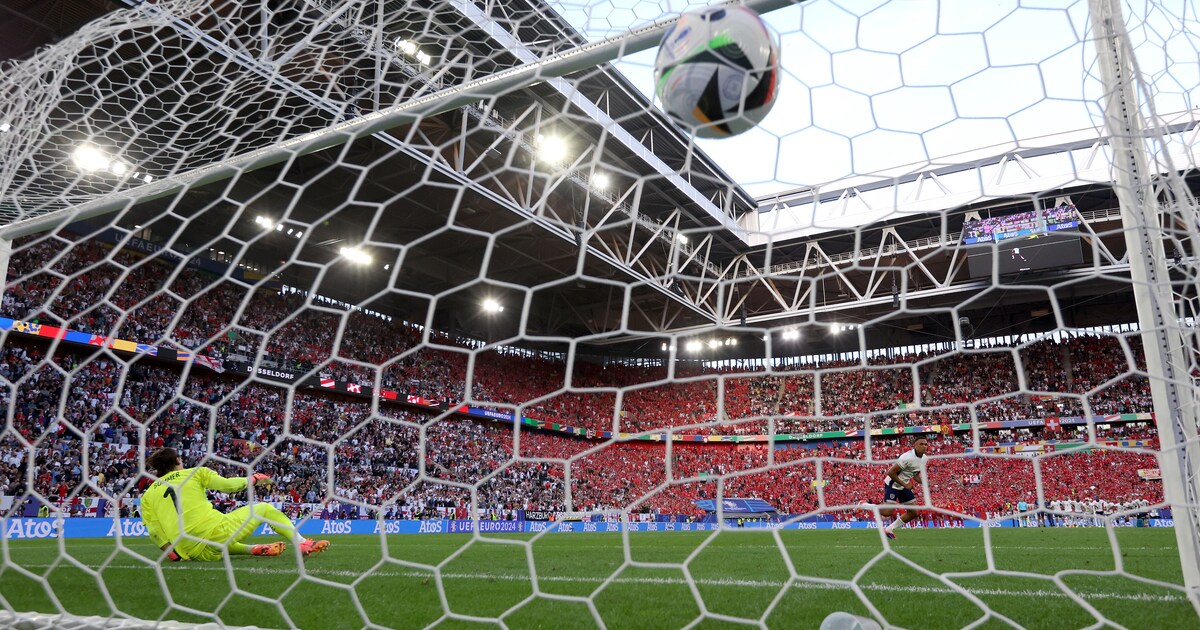
The fact that penalty-taking is a lottery is one of the biggest killers in football. What’s more, it has been proven untrue. Yet all five of Gareth Southgate’s predecessors as England manager (with the exception of Sam Allardyce) clung to the old cliché.
Because if taking a penalty was due to luck, you could always say that you were eliminated from a Euro or World Cup due to bad luck.
However, if the Netherlands and England have not yet decided their semi-final after 120 minutes, it will be anything but a lottery involving the (first) ten designated field players and two goalkeepers. Penalty-taking can be practised, and much more than that: the kick itself is only one facet of the scientific approach with which the English currently approach this type of penalty.
The inventors of modern football are dealing with a similar trauma regarding the penalty, as is the case in the Netherlands. England won only 2 out of 6 penalty shoot-outs at a European Championship and only 1 (out of 4) at a World Cup.
Holland, who were eliminated on penalties in the last World Cup against Argentina, score 1 in 4 in both tournaments, for example Spain, finalist, is doing much better and wins just over half of its penalties, considering all tournaments.
The final of the last European Championship, where England lost on penalties to Italy (2-3) at their own Wembley stadium, was devastating. What remains are the images of Rashford, Sancho and Saka having to return alone with the rest of the team after their mistakes.
Project Setup
Things had to change. With that in mind, a team-wide penalty shoot-out project was created. Chris Markham, an innovative guy working at the English Football Association, got in touch with Geir Jordet. The Norwegian sports psychologist, as a “penalty professor”, had written a book on the psychology of the penalty shoot-out and that had caused a stir for Markham.
A five-man team was formed around the English team, which focused solely on the penalty shot. The idea of a lottery was quickly discarded. Instead, in consultation with Southgate, everything that could influence the execution of a penalty was reviewed and scrutinised: the run, the angle, the speed. But also how long you wait before shooting, concentrating on your breathing and taking time as an objective.
Because penalty shootouts are all about control, Jordet told the tabloid Sun this week. ‘Having control over the situation, which means having control over the other person and control over oneself.’
Impeccable blow
What the Norwegian meant by this was put into practice by the English almost perfectly in the quarter-final against Switzerland. Cole Palmer, Jude Bellingham, Bukayo Saka, Ivan Toney and Trent Alexander-Arnold all shot perfectly. Toney even without looking at the ball.
England also proved to be much better at waiting than the Swiss. They took 1.3 seconds to shoot, while the English took 5.2 seconds after the referee’s whistle. Goalkeeper Jordan Pickford also challenged the Swiss by delaying his rituals, for which he supposedly apologised. It seemed to work: defender Akanji missed immediately.
“A very clever move,” said Jordet, who watched the series from a corner of the stadium near the goal where the penalties were taken. In a few tweets, he explained exactly why England had stuck to the plan that had been in place since 2021. For example, after their penalty kick, each player was picked up by a pre-designated teammate, for a walk of shame as in the previous Euro Cup.
Loading Twitter message…
And unlike back then at Wembley, Southgate was now consciously speaking only to the penalty takers and to them. friends in advance, instead of the entire national team. He did not make the mistake he made at the time by putting only Sancho and Rashford on in the penalties against Switzerland. All the penalty takers already had a few minutes or more in their legs.
Hasselbaink
The project also appears to include the appointment of Dutch striker Jimmy Floyd Hasselbaink. The former international allows the English to take some penalties per training session, while, according to player Phil Foden, the penalty shoot-out was initially too much practiced. He and Bellingham expressed their appreciation for Hasselbaink after the quarter-final victory.
If the penalty project offers guarantees for a good result against the Netherlands, should it come to that? Of course not, says Jordet. “You never have any guarantees. Even if you have a perfect setup and routine, you can still fail.”

.jpg?w=150&resize=150,150&ssl=1)



